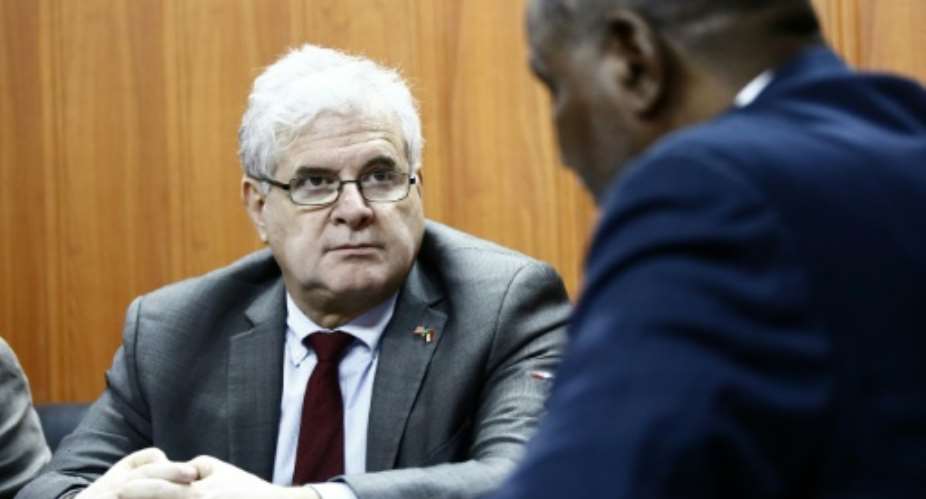El-Fashir (Sudan) (AFP) - The top US envoy in Sudan began Sunday a four-day trip to Darfur to assess security in the war-torn region as the UN prepares to downsize its 17,000-strong peacekeeping force.
The visit of Steven Koutsis, Washington's charge d'affaires in Khartoum, also comes just weeks before President Donald Trump's administration decides whether to permanently lift a two-decades old US trade embargo on Sudan.
A joint report sent to the UN Security Council last month by the African Union and the United Nations recommends that the ceiling set for military troops be cut by 44 percent and the maximum number of police reduced by 30 percent in the UNAMID force.
Ahead of the expected drawdown, Koutsis embarked on a visit to Darfur for a first-hand assessment of the situation in the region.
The envoy met several Sudanese and UN officials, as well as tribal chiefs, academics and members of civil society groups in the North Darfur capital of El-Fashir.
"We are now discussing with UN the restructuring of UNAMID," he told North Darfur deputy governor Mohamed al-Nabi at a meeting attended by an AFP correspondent in what is a rare visit by the international media to the conflict-wracked region.
"Now the responsibility will fall on local authorities to bring security to the state."
Nabi assured Koutsis that Sudanese security forces were equipped to tackle the security situation, but Koutsis expressed his "concern" over their ability at a separate meeting with academics and university students.
He said he was concerned "whether the local government and the national government are prepared to assume responsibility of providing security" to the people of Darfur.
Darfur has been engulfed in conflict since 2003, when ethnic minority insurgents mounted a rebellion against President Omar al-Bashir, complaining that his Arab-dominated government in Khartoum was marginalising the region that is of the size of France.
Bashir launched a brutal counter-insurgency, and the United Nations says that at least 300,000 people have been killed in the conflict and another 2.5 million have been forced to flee their homes.
Sudanese officials claim the conflict in Darfur has ended, but reports of fighting between government forces and rebels continue to emerge.
The cuts to the UNAMID force would result in major savings to the UN peacekeeping budget at a time when Washington is seeking to reduce its financial contribution to the blue helmets.
UNAMID has a budget of $1.04 billion per year, making it one of the UN's costliest missions along with the UN force in the Democratic Republic of Congo.
Washington is expected to decide next month on whether to permanently lift its trade embargo on Khartoum imposed in 1997.
Before leaving office, president Barack Obama eased US sanctions, but kept Khartoum on a six-month probation period before Washington formally lifts the trade embargo.
The sanctions were imposed over Khartoum's alleged support for Islamist groups.
Late Al-Qaeda leader Osama bin Laden was based in Khartoum from 1992 to 1996.





 We’ll no longer tolerate your empty, unwarranted attacks – TUC blasts Prof Adei
We’ll no longer tolerate your empty, unwarranted attacks – TUC blasts Prof Adei
 Bawumia donates GHc200,000 to support Madina fire victims
Bawumia donates GHc200,000 to support Madina fire victims
 IMF to disburse US$360million third tranche to Ghana without creditors MoU
IMF to disburse US$360million third tranche to Ghana without creditors MoU
 Truck owner share insights into train collision incident
Truck owner share insights into train collision incident
 Paramount chief of Bassare Traditional Area passes on
Paramount chief of Bassare Traditional Area passes on
 Two teachers in court over alleged illegal possession of BECE papers
Two teachers in court over alleged illegal possession of BECE papers
 Sunyani: Victim allegedly shot by traditional warriors appeals for justice
Sunyani: Victim allegedly shot by traditional warriors appeals for justice
 Mahama vows to scrap teacher licensure exams, review Free SHS policy
Mahama vows to scrap teacher licensure exams, review Free SHS policy
 Government will replace burnt Madina shops with a new three-story, 120-store fac...
Government will replace burnt Madina shops with a new three-story, 120-store fac...
